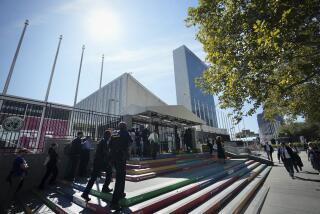Shevardnadze Turns Tables on U.S. : Agrees on Need to End ‘Small Wars,’ Offers Different List
- Share via
UNITED NATIONS — Soviet Foreign Minister Eduard A. Shevardnadze agreed with President Reagan today on the need to end “small wars” around the world but blamed U.S. policies for many of the conflicts and said arms cuts should remain the No. 1 priority.
Shevardnadze, addressing the 40th anniversary of the United Nations two hours after Reagan, read a message from Soviet leader Mikhail S. Gorbachev saying that ending the nuclear arms race should be the paramount concern between the superpowers.
The foreign minister also attacked the American “Star Wars” anti-missile defense program and plugged the Soviet plan for “star peace.”
Reagan Meeting Set
Shevardnadze planned to meet Reagan later today to discuss preparations for the Nov. 19-20 summit between Reagan and Gorbachev in Geneva.
Reagan, in his U.N. address, proposed an initiative in which the superpowers would work to settle regional conflicts around the world.
Shevardnadze did not specifically mention Reagan’s initiative but referred pointedly to the same subject.
Reagan cited Afghanistan, Cambodia, Ethiopia, Angola and Nicaragua as regional conflicts that must be addressed, and cited Soviet involvement in those countries.
Vietnam, Middle East
Without mentioning the United States by name, Shevardnadze listed Vietnam, which he said has been unable to recover from “barbarous aggression” by the United States; Southern Africa, “where Israeli and South African terror has become a harsh everyday reality for several generations,” and Nicaragua, where he said U.S.-backed contra rebels “are killing thousands of people.” He also cited the Middle East and Afghanistan.
“Yes, we have succeeded so far in saving the world from the scourge of a ‘big’ war, which in itself is a great accomplishment,” Shevardnadze said. “But can this alleviate the sufferings caused to the nations by the so-called small wars?
“Indeed, the sufferings they inflict upon people and countries are not small but enormous; they bring them untold sorrow and throw them dozens of years back in social and economic development.”
Nuclear Weapons Plea
Before Shevardnadze spoke, Chinese Premier Zhao Ziyang addressed the assembly and asked the superpowers to embark at their November summit on the road to “thorough destruction” of nuclear weapons.
“We are opposed to the arms race, be it conventional, nuclear, on ground or in outer space,” Zhao said. Neither “deterrence” nor “balance of terror” can ensure peace and instead both have led to “spiraling intensification of the arms race,” he said.
China has shown its commitment to reducing world tensions by “cutting the size of its military force by 1 million,” he said.
British Prime Minister Margaret Thatcher, French Foreign Minister Ronald Dumas and New Zealand Prime Minister David Lange were also scheduled to address the assembly today.
“I believe they are failing in their duty to the United Nations, to mankind and to peace,” she said.
More to Read
Sign up for Essential California
The most important California stories and recommendations in your inbox every morning.
You may occasionally receive promotional content from the Los Angeles Times.












